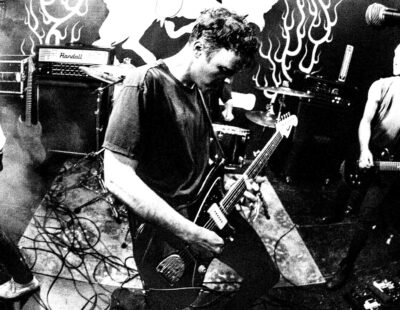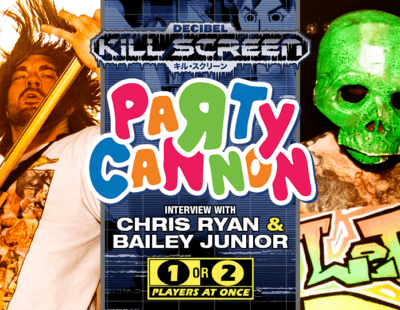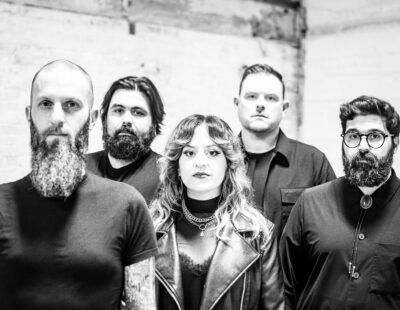
The profoundly shocking and sad news of Chris Cornell’s death by suicide at age 52 has obviously hit the music world and, more importantly, his family, friends and bandmates, incredibly hard. Cornell was a singular talent as a vocalist and songwriter. He will certainly be remembered as one of the greatest in rock music history.
On March 15, 2017, I conducted what may be one of the last interviews with Soundgarden vocalist/guitarist Chris Cornell. I was working on a Hall of Fame feature (and cover story) for Decibel on the band’s Ultramega OK album. And, in accordance with Decibel’s requirement that all members must be interviewed to induct an album into the HoF, Cornell was my last interview. In fact, we had three previous interviews scheduled, but due to publicist error, a no-show on Cornell’s part and my error, those three never happened. I was even told after three failed attempts that the interview wasn’t going to happen because Cornell was now too busy promoting his new solo single, “The Promise.” I made an impassioned plea to the band’s management—the slated Decibel cover story wouldn’t happen without Cornell’s input—and they found a way to get me 20 minutes on the phone with him as he took a break from shooting a video for “The Promise.”
In spite of the three previous misfires with our scheduled interviews, Cornell didn’t seem annoyed or put out. He answered my questions about things that happened nearly 30 years ago honestly and thoughtfully. He even seemed willing to go beyond my allotted 20 minutes, but his publicist broke into our conversation and cut it short. Here’s the full transcript of that interview.
It seemed like you had a solid relationship with Sub Pop after Screaming Life, Fopp and your first single, so why the move to SST?
[To be on SST] was our goal before Sub Pop was even a label. We started as band in 1984 and probably by 1986 you can say that like 60 or 70 percent of the most vital post punk indie bands out there were either SST artists or had at least released one album on it. They were smart at the time about catalog sales. If they could just in a timely way release an album from a band that had meaningful sales in the indie world then they would have it. They had a lot of amazing bands. That was our ultimate goal, really. We weren’t a band that was thinking about the big business of corporate music, we were a band that was thinking about, A) hopefully getting our songs heard, which means putting out an indie record, and the label we want is SST.
And were there any hard feelings with your friends at Sub Pop?
SST had actually called Bruce [Pavitt, Sub Pop co-founder] and said we’d love to put out an album with Soundgarden, do you have a problem with that? He said no and you should go do that, and that was it. We’d kinda made it in our minds. It was exciting.
My impression at the time was that Soundgarden had pivoted toward a heavier sound, starting to leave behind the more punk and post-punk aspects of Screaming Life. Was this due to who was doing the songwriting, or just an evolution of the band?
It was kind of a devolution of the band in a way. Because what happened, I think, starting with Screaming Life, is that the songs on that were the most recent ones we’d written. And that was at the time what we were most excited about releasing. That’s how that EP became that. But we had a lot of material aside from that. I don’t have the track listing of Ultramega OK in front of me, but a lot of those songs either were either kind of in some stage of being written or had already been written before any of the songs on Screaming Life. In a sense we were going back [on UMOK], and also writing some new songs to kind of fill out a whole album. We really wanted a lot of our songs to be heard that otherwise wouldn’t have been, so Ultramega OK was kind of a picture of us at the time combined with a picture of what we had been doing since we started the band, leading up to Screaming Life.
Somehow in the middle of [writing songs in this time], we realized that the thing we were doing that was special, that was different than everybody else, was our combination of influences that included a pretty aggressive hard rock side. How that came about and what influenced the heavier, harder side and what influences were sort of the more post punk side, it was all kind of mixed up and difficult to really nail down. And that was our power I think. We were unclassifiable, but we were unselfconscious about songwriting so we weren’t manufacturing anything. I think we kind of knew that we were doing something that no one else was doing and as much as I think Screaming Life was a snapshot of like two weeks of songwriting, I think Ultramega OK, was showing a broader picture, and that broader picture kind of led us into the future, where I would say the defining album of that future was Badmotorfinger.
How much of the material that ended up on UMOK was from the Screaming Life (and before) era and how much was new?
The amount of time that separated the songs, for example, on Sub Pop and some of the older songs that were on Ultramega wasn’t that much time. We’re talking about a few months. But I think that a young band’s trajectory happens so quickly that it’s really hard to say what making the decision to go back and [record] some unreleased songs, as well as add new songs, what that meant. I think that what it did was it helped shape what we were going to do in the future in a way that might not have happened if every single thing on the album was written after the songs on Screaming Life.
With all this material you still had, why record a cover song, “Smokestack Lightning”?
I’m not really a hundred percent sure of how we made that decision, but there was a repertoire decision where we [recorded] “Smokestack Lightning” and put that on the album and then the song that Hiro wrote called “Toy Box” was a B-side. I don’t know if it was him, or who it was, why we wanted to put this stupid cover on the album and not put this brilliant original song on instead. That’s the other thorn in my side about Ultramega OK. We talked about [making that change on the reissue], but I guess after all these years with the reissue we decided we were preserving history and didn’t switch that. But I wouldn’t have minded. [Laughs] Finally you make the perfect album that you were supposed to be making at the time.
You started playing guitar in the band at this point. How did that change the musical and songwriting dynamic, if at all.
If I was playing guitar, it kind of meant that I was bringing in entire songs, because I was also the lyricist. I had no idea how to play guitar so I was just kind of making it up and writing a song. That ultimately ended up being part of what our sound was—these songs based on guitar compositions from a completely guitar-illiterate person. So I was doing things that were unusual, because I didn’t know if it was or wasn’t OK. I wasn’t following any blueprint really. Kim was probably my biggest guitar influence at the time because of that.
During the original recording and mixing process with producer Drew Canulette, did you have issues with the sounds the band was getting at the time?
In terms of recording, I don’t remember if it was any different than recording any other album. I think when Soundgarden would be recording songs in a studio, whether it was two songs or 10 songs or whatever, and regardless if was Terry Date or Jack Endino or Stuart Hallerman or Drew Canulette, we were always in a fight to get the sounds that we wanted. Nobody gave us what we thought our sound was. We had it and we knew what we wanted and we agreed on it as a band, for sure. There were always arguments. I argued with Jack all the time. Everybody did. That was part of the tension of what made good recordings. We certainly did that with Drew. But I don’t remember in the middle of if feeling like this is going south. We recorded and mixed the album outside of our comfort zone in Seattle and outside of our own scene and I don’t necessarily know that we had the references to hear the differences of what was happening versus what we’d done that we know we already like.
What I know is that once I took the mixes home, the first thing I did when I got home was [compare] them to some of the same songs that we’d recorded with Jack for a demo. And I kind of knew as I was popping in the cassette of Jack Endino’s [rough demos] that I was going to like those more. But what I didn’t realize how much more I was going to like it. It was like night and day. Everything about it felt so much better. That was the single-most exasperating and terrifying moment of my career as it pertains to Soundgarden. Because it was a crucial moment for us to not get this wrong. We’d gotten a lot of attention from a lot of different labels. We had become as big as you could get really, in terms of selling records, on a post-punk indie label. We had offers from virtually every major label worldwide and we couldn’t really afford to screw that up. And yet it seemed to me to be screwed up. I remember at that time there was a lot of encouragement about the album. People were saying, no, it’s great, don’t worry about it. Jack remixed “Flower” just to see is it broken-broken or could it be remixed. It came back where we could listen to [Jack’s] remix of what Drew recorded and then listen to the rough demo Jack had recorded earlier and they sounded almost exactly the same. It was very close sonically. And so I realized that OK, it wasn’t broken. From that moment on, I think we always knew we would rerelease it with Jack Endino remixing it. Now we have what I believe is pretty close to what that album should have sounded like.
Separating sonic quality of the original finished product with the material itself, this album felt like a big step forward for Soundgarden. Did the band feel the same way at the time?
People made us feel OK about [the recording]. I remember talking to Kurt Cobain outside of a club about Bleach, and telling him how I didn’t really like the way Ultramega OK was sounding. He was totally surprised and said it sounded amazing. And I felt like maybe we were just too close to it, because that happens. In terms of rereleases, there’s more juice in this simply because it’s been hanging over my head for so long, the things that didn’t go right about it and now we get to present them in the light that they always should have been and that’s pretty great.
Any thoughts on UMOK’s Grammy nomination in 1990 and being included in the category with Metallica, Faith No More, Queensryche and Dokken?
It was really exciting because it felt like an indication that somehow the Grammys actually maybe get it right sometimes and maybe there is some meaning behind it. It was that first glimpse into feeling like we were being taken seriously by a broader demographic that included a jury of our peers. It was surprising and it felt good. It felt like we were going in the right direction. It meant something to me at the time. We got a nomination [an album] that very few people had heard about or heard. It felt a little bit conciliatory simply because they were inventing new Grammys to give away in genres where there wasn’t a lot of quality. Hard rock/heavy metal at the time specifically was existing in that world, most people either didn’t know about or it was shitty commercial rock and was kind of the bottom of the barrel what was being released commercially at that time.
What did you think about being included in the category with Metallica, Faith No More , Queensryche and Dokken?
I’m sure there were a lot of Dokken fans sitting at home thinking, how’s that possible? How were they not the best? [Laughs]
The complete seven-page story on the making of Soundgarden’s Ultramega OK is available in the June 2017 issue of Decibel.





